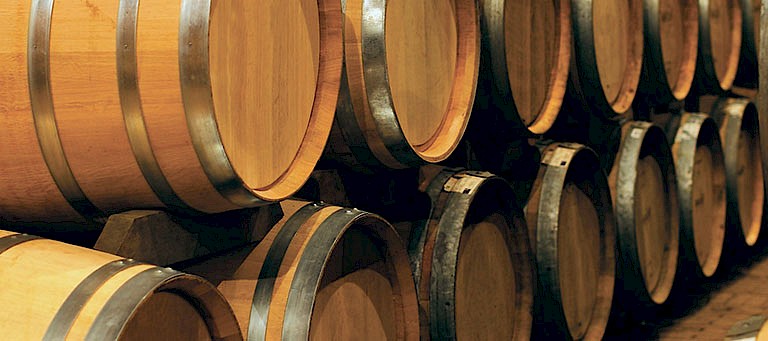
Preserve the value of your wine
Managing Brettanomyces proactively through onsite analysis at the winery
vinoBRETT is game-changing detection technology than brings affordable, onsite PCR testing to your winery. vinoBRETT makes it possible to conduct routine, proactive testing throughout the winemaking process to obtain accurate information about the presence and level of Brettanomyces at any time.
Invisible Sentinel’s wine quality products are powered by Veriflow® - a game-changing platform technology that combines proven diagnostic principles for microbial detection and innovative, first-in-class scientific approaches. Veriflow technology offers unparalleled performance with no compromise in ease-of-use or affordability.
The Veriflow system is comprised of a small customized thermocycler, pre-aliquoted PCR reagent tubes, and proprietary buffers. Semi-quantitative test results are obtained in less than 4 hours via hand-held cassette, and quantitative results can be tracked, stored, and exported via the Veriflow Reader.
Early detection at low levels
Using vinoBRETT, winemakers identify the presence of Brettanomyces long before the effects of 4-EP/EG exceed the sensory detection threshold. Brettanomyces management begins as early as the fermentation stage, which allows for proactive management with less intrusive methods before extensive or damaging remediation measures are required.
- Robust detection even in young wines
- Identify at-risk barrels to isolate and prevent cross-contamination
Speed, accuracy and sensitivity
Veriflow technology is AOAC International Certified for foodborne pathogen detection. vinoBRETT was developed specifically for wine makers and has been validated and implemented by a variety of award-winning, quality-centric wineries around the world.
- Internal and external laboratory validation in collaboration with Jackson Family Wines and Enartis Vinquiry
- 100% inclusive of 49 known isolates of Brettanomyces bruxellensis1
- Correctly excluded 100% of multiple species of commonly occurring microorganisms found in wine
1 Strains sourced for University of California-Davis Wine Microbe Collection, Department of Viticulture & Enology
Simple and cost-efficient deployment
vinoBRETT is ideally suited for use in the winery – with a modest capital investment and affordable per-test cost. Sample collection and prep is simple, and can be completed by enologists and winemakers with minimal training.
- The systems quantifies viable Brettanomyces populations in less than 4 hours
- Requires only minutes of hands-on time to perform the test
Proactive management to preserve quality and value
Detecting spoilage organisms early and at low levels enables Management:
- Less intrusive methods, including temperature modulation, higher SO2, lower pH
- Minimal labor requirements
- Ability to isolate tainted lots early to minimize cross-contamination
- Minimal to no impact on wine quality and value
Economic Impact: Negligible ($)
Detecting spoilage organisms late and at high levels requires Remediation:
- More intrusive methods, such as filtering, blending, additive treatments
- Labor-intensive processes such as sterilization, barrel access, barrel cleaning
- Increased costs and hassles in the event of cross-contamination
- Potential for bulking out or discarding wine
Economic Impact: Significant ($$$)
Benefits of using vinoBRETT
“Early in-house Brett monitoring in wines during and just after fermentations, which was impossible to do before, allows us to effectively mitigate problems and avoid potential problems later in the process.”
“The test is easy to perform and interpret. Because we can now detect Brett sooner, our winemaker can take corrective actions before sensory impacts arise. We can isolate problem barrels or lots, and manage the impact of Brett. This tool enables us to do a better job of preserving quality.”
Test protocol
Results in 4 Hours with Less Than 10 Minutes Hands-on Time
COLLECT
Collect a homogenous sample in a conical tube and centrifuge. Resuspend sample using provided proprietary Buffer A.
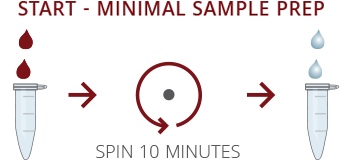
DIGEST
Transfer resuspended sample into provided DIGEST reagent tube. Place tube into Veriflow Thermocycler and run program.
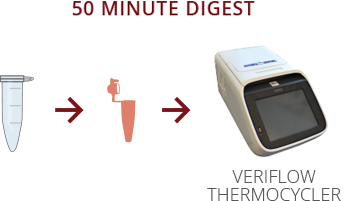
AMPLIFY (PCR)
Transfer sample from DIGEST reagent tube into provided PCR reagent tube. Place tube into Veriflow Thermocycler and run program.
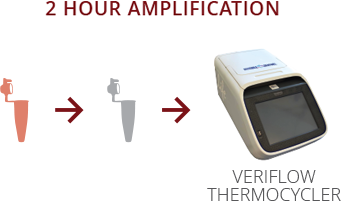
ANALYZE
Remove PCR reagent tube from Veriflow Thermocycler and add proprietary Buffer B. Dispense contents of tube onto test cassette window. Wait 3 minutes and retract test cassette switch to reveal test results. One line indicates negative result, two lines indicates semi-quantitative positive results. Use Signal Quantification Card or Veriflow Reader for precise quantification.
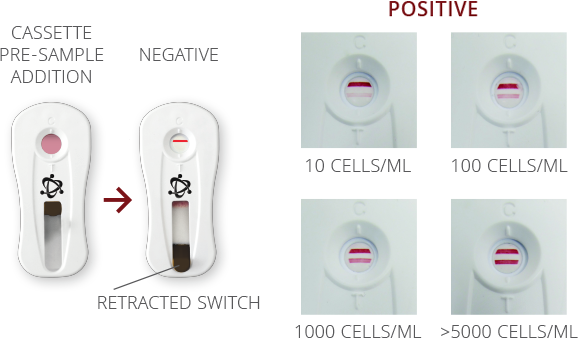
Technical specifications
Veriflow DNA Signature Capturing Technology
| DNA Amplification | Proprietary reagents eliminate need for sample purification |
| DNA Identification | Proprietary DNA signature detection specifically targeting Brettanomyces |
| Visualization of Results | Vertical flow mediated visualization of results for easy interpretation via hand-held cassette |
| Sample Preparation | No enrichment or purification steps required |
| Certification | AOAC International Certified for foodborne pathogen detection |
| Current Utilization | Food and juice manufacturers, premium wineries, craft breweries; global 3rd party testing labs; U.S. and international |
vinoBRETT Performance Specifications
| Sensitivity (LOD) | 10 cells/ml |
| Time to Results | < 4 hours |
| Matrix Compatibility | Juice, wine, lees, barrel rinsate, colony PCR, enrichment broth |
| Assay Configuration | Qualitative and quantitative |
| Target Selection | Ribosomal Deoxyribonucleic Acid (rDNA) gene |
| Specificity | Brettanomyces bruxellensis |
| Active state and VBNC state (Viable But Non-Culturable) |
vinoBRETT Validation
| Validation Studies | Internal and external laboratory validation in collaboration with Jackson Family Wines and Enartis Vinquiry |
| Inclusivity | 100%. Correctly identified 49 known isolates of Brettanomyces bruxellensis1 |
| Exclusivity | 100%. Correctly excluded multiple species of commonly occurring microorganisms found in wine |
1 Strains sourced from University of California-Davis, Wine Microbe Collection, Department of Viticulture & Enology


